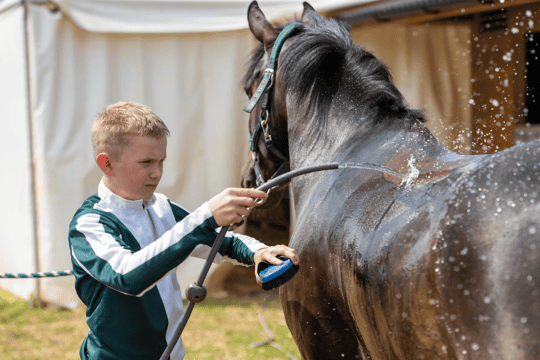
HomePony Know HowPony Care TipsHealthDoes your pony need a health check?
-
Pony Care Tips
Learn everything you need to know about caring for your fave pony. From feeding and grooming to mucking out – we have it all here!
-
Riding Tips
Improve your riding with our fab articles! Whether it's building your confidence, riding shapes, or jumping spreads that you need tips on, we have something for every rider.
Latest News
Does your pony need a health check?
Posted in Health
A handy guide to your pony’s annual health check

Regular health checks by your pony’s vet are a key part of maintaining his good health and welfare, but why are they so important? Let’s find out more with the help of an expert.
Top tip
Older ponies or those with underlying health conditions might need more frequent health checks, so speak to your vet for advice on how often you should get them done.
Why, oh why!
Scheduling in an annual health check for your pony can help your vet spot early signs of disease. As well as this, your vet might be able to identify potential issues based on his age, breed, workload and management.
It’s also a really good chance for you to discuss how to prevent illnesses and injuries, talk about things to look out for, form a specific management routine and plan for a fun-filled year ahead!
Part of the plan
Your vet will perform a thorough physical examination of your pony, including…
- listening to his heart and lungs at rest
- checking his eyes, skin and his feet
- watching him trot up to check for lameness
- assessing his weight and body condition
Top tip
Keep a log of all the info that’s provided by your vet to remind you of what’s normal or when he might have had a specific problem. Doing this can play a part in helping you to prevent your pony becoming ill and it means you can act quickly if you notice he’s not right.
Added extras
Some vets will also carry out other checks and tests on your pony. You vet will be able to tell you what’s involved as part of their annual health check, but extras might include…
- teeth check – and rasp if needed
- routine vaccinations – if they’re due
- worm egg count – your vet can formulate a worming plan to suit your pony and offer advice on which wormer to use, if any. They might carry out blood or saliva tests to check for specific types of worms, too
- weight management advice – your vet might discuss a feeding plan with you to help keep your pony in good shape
- performance assessment – if you have any concerns about your pony’s health or performance, your vet can start to investigate these further
- blood tests – to assess your pony’s general health. Routine blood tests involve red and white blood cell counts and checking the function of his organs (such as liver and kidneys), or more specific blood tests are used to check for diseases (such as Cushings and equine metabolic syndrome)
Whatever checks and tests your vet carries out on your pony, they’ll be able to offer you plenty of advice on treatment required and changes to your management regime that will be beneficial to his wellbeing.
Time is ticking
Health checks can be done at any time of year, but most vets advise to have it in winter. Doing it during the colder season means your vet can make sure he’s in top condition before his workload increases as the sunny weather arrives. He’s most likely to go through a dietary change at this time of year, too – he’ll be eating more hay or haylage in winter, and more grass in summer.
Our expert – Georgie Hodson is an equine vet at Haven Vet Group






















Leave a Reply
You must be logged in to post a comment.